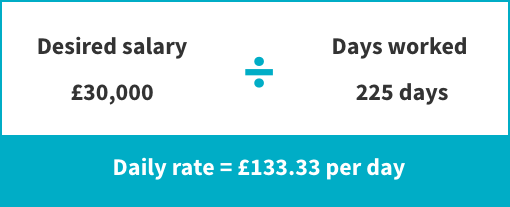What is a freelancer?
Essentially, a freelancer is somebody who works for themselves on a contract by contract basis rather than having a traditional employment contract with a company. (There are a growing number of people who take on freelance work in their spare time alongside their job.)
Almost any job can be done by someone working as a freelancer. However, marketing and advertising, IT consultancy, language translation/interpretation, graphic design and illustration are all typically associated with freelancing.
Is freelancing right for me?
While there are many benefits to going freelance and it can seem like an attractive option for many professionals, freelancing isn’t for everyone. You’ll need to think about your current personal and financial situation as well as your plans for the future. For example, if you wanted to buy a house, quitting your job with a regular income could mean your mortgage application gets rejected or you can’t borrow as much as you’d planned.
When you’re trying to decide if freelancing is right for you, writing out the pros and cons can be a good place to start. Here’s a more general list to give you an idea of where to start.

Pros
- Freedom to choose your working hours
- More flexibility can give you a better work-life balance
- Control over your career and the type of work you do
- No office politics – you are your own boss

Cons
- You need to be proactive to find work
- No employer pension or holiday pay
- You’re responsible for filing returns and paying your tax
- Need to chase up late payments from customers
- Working on your own can be lonely
How much should I charge for freelance services?
Like many people who work for themselves, how much you charge for your services will vary depending on a number of practicalities, especially when you’re just starting out. The amount you can charge will depend on where you’re based in the UK and the industry you work in.
If you’re unsure how much to charge, you could use your previous salary within the industry as a starting point to working out your daily rate.
Calculating your freelancer daily rate
Let’s say you want to earn £30,000 per year (before tax) as a freelancer. You’ll need to divide that by the number of days you’ll work in the year. If you work five days a week and take 28 days holiday, you’ll work 225 days of the year.

Remember, this is just a guide and you’ll need to consider the additional costs associated with working for yourself like insurance, tax, national insurance, pension contribution.
How to start freelancing: An easy guide
Now you’ve decided that a career as a freelancer is for you, here are the practical steps you’ll need to take to make that a reality.
Top tip:
Don’t rush to quit your day job. Keeping your job will give you extra stability while you’re still establishing yourself as a freelancer.

Step 1: Write a freelancer business plan
As with most things in life, it’s always good to be prepared. When you’re starting out as a freelancer, you’ll need a business plan. But don’t worry, it’s not as complicated as you might think. Start by writing down some general ideas and goals and take it from there.
You could also ask yourself questions like these to help you plan.
- Who is my target market?
- What is demand like for jobs in my industry?
- Where will I work?
- Why would people want to work with me?
- When can I start freelancing?
- How will I accept payments?
- What are the additional costs associated with freelancing?
When you’re writing your business plan, make sure to include a ‘mission statement’ which is a quick summary of your freelance business – what you do, who it’s for and what makes you different. If you find yourself struggling later down the line, referring back to your mission statement can help you stay on track and remind you of why you do what you do.
If you’re not sure where to start when it comes to putting pen to paper and writing your business plan, don’t worry AXA’s template can help.

Step 2: Freelance: sole trader or limited company?
Choosing how you operate as a freelancer is really important because it affects how much you earn and the amount of tax you need to pay. You’ll need to decide whether you want to be a sole trader or start a freelance business as a limited company. There are other options for registering as a freelancer such as entering a partnership, but these two are the most common.
Here’s some information to help you decide what’s right for you…

Sole trader/Self-employed freelancer
A person who’s the only owner of their business. There’s no legal separation between you as the business owner and the business itself. Sole trader is the most popular type of business in the UK.
How to register as a sole trader: All you need to do is visit the HMRC website armed with your National Insurance number and complete the registration forms.
A guide to becoming self employed
Limited company
A business which is a distinct legal entity from the business owner, formed whether you’re a one-person operation or have a few members of staff.
How to set up a limited company: This is slightly more complicated than registering as a sole trader. You’ll need to pick a name, register an official address and appoint a director and at least one shareholder.
A guide to setting up a limited companyThere isn’t a one-size-fits-all approach to this decision; being self-employed will suit some freelancers and starting a company will work better for others. As well as doing your own research through online blogs and articles, you could also speak to other freelancers in your industry to find out what worked for them. The kind of customers you want to work with could also guide your decision too because some organisations might need you to operate as a limited company before they can agree to work with you.
When you’re deciding how you’ll work as a freelancer, the most important thing is that you don’t rush your decision and take the time to figure out what will work best for you.

Step 3: Protect yourself: Freelance insurance
The freedom you get working for yourself comes with its additional responsibilities. As a freelancer, you need to deal with the consequences if someone makes a claim against you. Even the most cautious and experienced workers can make mistakes. And sometimes things happen that are out of your control. That’s why having the right cover in place is so important because it means you don’t need to worry about being solely liable for legal and compensation fees.
AXA’s business insurance puts you in control. You can tailor the cover to suit your exact requirements so you’re only paying for what you actually need.

Professional indemnity insurance
If you provide advice or a service that customers pay for, they could try to take legal action against you if they think you’ve made a mistake or cost them money. Expert legal support to defend a claim– plus any compensation you need to pay to settle it – can be very expensive. Professional indemnity insurance will help.

Public liability insurance
If the unthinkable should happen and someone’s accidentally hurt while they’re visiting you or you’re visiting them, you need to be covered. Equally, if you cause accidental damage to someone else’s property or they do to yours, public liability insurance will protect you from a potentially costly legal dispute.

Equipment
Will you need to use a computer, smartphone or any other equipment when you go freelance? They probably won’t be covered by your home insurance. You can add business equipment to your business insurance policy.
Not sure where to start?
Check out the AXA Business Insurance Wizard. Just answer four simple questions and you’ll get a list of the insurance you’ll need as a business consultant.
Visit the Business Wizard
Step 4: Find freelance work and clients
So you’ve got your plan in place and chosen the legal structure of your freelance business, now it’s time to find some customers. While the end goal is to have customers coming to you, when you’re starting out you’ll probably need to be more proactive. Every freelancer has their own ways and means, but we’ve outlined some of the most common methods freelancers use to secure work.

Freelance job sites
Websites like Upwork, People Per Hour and freelancer.co.uk allow you to register and ‘bid’ for freelance projects. You’ll then be paid for your work through the website after the client approves the work. It’s worth noting that freelance job sites might not be the best long-term strategy when it comes to securing work because there’s often so much competition that the work isn’t well-paid. But, they are a great way to get your foot in the door and build up a portfolio of freelance work.

Networking/Word-of-mouth
If you’ve worked in your particular field for a few years, you’ll probably have an impressive list of industry contacts. Use this to your advantage and spread the word that you’re going out alone as a freelancer. From connecting with new clients, to raising the profile of your company, networking is a great way to secure your first clients as a freelancer.

Social media advertising and marketing
Social media can be an easy and cost-effective way to advertise your freelance services. Instagram works well for visual businesses like graphic designers, Facebook likes wordier posts which is useful for freelance writers and journalists, and LinkedIn is great for professionals or business to business services. You can pay to promote your posts to reach the more people which relatively cheap compared to more traditional advertising platforms. Having a strong social media presence not only helps to advertise your services, but it’s also a great way to interact with your customers.
Ready to become a freelancer?
Whether you’re self-employed or starting a limited company, as a freelancer, it’s important to make sure you’ve got the right insurance cover in place. Get started with AXA’s insurance for freelancers.